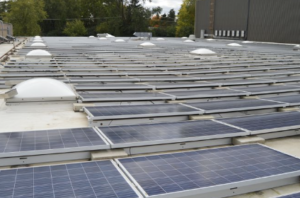With this year’s UN Climate Summit, COP28 just days away, all eyes are on the host city, Dubai, one of seven emirates in the United Arab Emirates (UAE), with the largest population. While Seven Generations Ahead is driving the development of solar energy locally, we’re looking at the progress Dubai has made in this area.
 Dubai has been assuming a leading role in the development of renewable energy, primarily photovoltaic solar power. Dubai and Abu Dhabi have been leading in utility scale installations, while a new initiative of distributed renewable energy is now underway in all of the emirates, to varying levels of growth.
Dubai has been assuming a leading role in the development of renewable energy, primarily photovoltaic solar power. Dubai and Abu Dhabi have been leading in utility scale installations, while a new initiative of distributed renewable energy is now underway in all of the emirates, to varying levels of growth.
The UAE has 6,000 MW of renewable energy capacity, of which most are in Dubai. The centerpiece of this effort is the Mohammed bin Rashid Al Maktoum Solar Park, begun in 2013 with a 13 MW PV project, and presently at around 3,000 MW, including 700 MW of concentrated solar thermal systems. The Solar Park development is expected to be complete at 5,000 MW by 2030 according to the Government of Dubai Innovation Centre. The UAE is targeting net zero carbon usage by 2050, but not methane.
The growth of renewable energy in the UAE has been significant in the past decade, but is still a single digit percentage of its electricity mix. It is a small percentage in an economy that exports 3.2 million barrels per day of petroleum products and 2.1. trillion cubic feet (tcf) per year of gas/methane products, as well as using 2.5 tcf-yr domestically, according to the International Energy Agency.
The latest (2021 International Renewable Energy Agency) mix of electricity in the UAE is 94.12% from gas (124,109 gigawatt-hours (GWh)), 3.68% from solar PV (4,853 GWh), 1.22% from petroleum (1,604 GWh), 0.81% from nuclear (1,067 GWh), 0.17% from solar thermal (221 GWh), and <0.01% from biomass/waste (6 GWh) and wind (1 GWh).
The number of electric vehicles in the UAE, primarily Dubai, is 7,331 in 2023 (US International Trade Agency), out of a UAE fleet 3.5 million vehicles (Staistica.com).
These numbers tell a story that the UAE, like many countries, is incorporating more renewable energy and sustainable technologies into the mix, but still has a long way to go. We’re eager to see what progress can be made at COP28.
